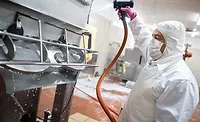Choosing the Right Pest Control Provider for Your Facility
Pest control should be a priority for any food processing facility. Pest issues can make up 20 percent of your audit score, so it’s important to have a great pest management plan in place.
But your pest management program is only as good as the pest management provider with whom you partner.
Earlier, I wrote about how your facility should proactively implement an ongoing, comprehensive and well-documented integrated pest management (IPM) program, which focuses on strategies like sanitation and facility maintenance to help prevent pest activity. Implementing an IPM program is half the equation. Now, you need to find the right, licensed pest management professional who will partner with you to implement all of these tactics to help keep pest problems away.
IPM should be the foundation of any program you implement with your pest management professional. Instead of waiting for a pest problem to occur, IPM takes a proactive approach to managing pest activity, using chemical treatments only as a last resort. IPM is the preferred practice of NSF International and helps meet and exceed the requirements of several industry auditors.
Needless to say, if a potential pest management provider doesn’t know what IPM is, you should take your search elsewhere.
Pest management today is not a one-size-fits-all approach, and that’s why a man with a sprayer just won’t cut it as a pest management plan. The industry has become completely customizable, with pest management programs as unique as the facilities they are used in. That’s why you need a provider who can tailor an IPM program specifically for your facility and your needs.
Once you’re ready to start searching for a provider, keep these points in mind:
• Start with an inspection. A pest management provider shouldn’t offer you a plan without initially assessing your property first. In fact, potential providers should inspect your facility on their first visit and bring in pest specialists who understand pests’ behavior and how to manage them.
• What do your colleagues think? If you’re looking for pest management recommendations, your industry colleagues can be a good place to start. In the case that your facility is part of a larger network, you may also consider talking with other managers about their pest management providers and their results—both positive and negative.
• Get the details in writing. The U.S. Food and Drug Administration’s Food Safety Modernization Act requires food processing facilities to develop and execute written food safety plans that detail likely hazards, corrective actions and results. That’s why it’s important for your pest management professional to thoroughly document any service visits and corrective actions. A copy of this documentation should remain on-site at the facility in case an inspector shows up for an audit. You want a provider who uses this info to determine pest trends, which will aid in their decisions about how to best manage pest activity going forward.
• Audit support. Because pest management can account for up to 20 percent of a total audit score, there’s a lot riding on the success of your pest management program. In addition to documentation, your pest management professional should work with you to ensure any documentation is in proper order and presentable for auditors to review at any time. Look for a pest management provider that can help you get prepared for the third-party auditor, based on the food safety standards with which your facility is required to comply, and even provide on-site support the day of your audit.
• What about training? Ask potential pest management providers if they offer staff trainings or educational materials such as tip sheets and checklists to help put pest management into perspective for your staff. Your staff plays an important role in reporting pest sightings and keeping your facility clean. Most reputable pest management providers offer complimentary staff training. Also, if your facility requires that your staff earn continuing education credits, make sure your pest management professional has the proper expertise and resources to provide the training.
Once you choose a pest management provider, take time to meet with them and discuss the roles of everyone involved. Establish benchmarks for your pest management program and set up specific times throughout the year to evaluate the program’s success and areas of improvement with your provider.
Use these suggestions, and your next pest management provider could become a long-term partner.
Zia Siddiqi, Ph.D., B.C.E., is director of quality systems for Orkin. A board-certified entomologist with more than 30 years in the industry, he is an acknowledged leader in the field of pest management. For more information, e-mail zsiddiqi@orkin.com or visit www.orkincommercial.com.
Looking for quick answers on food safety topics?
Try Ask FSM, our new smart AI search tool.
Ask FSM →







.webp?t=1721343192)
